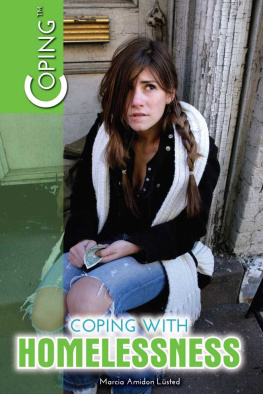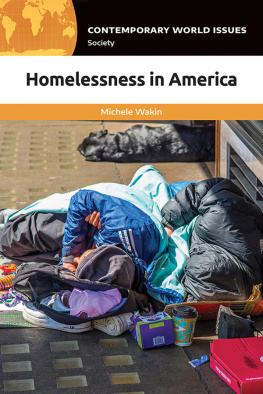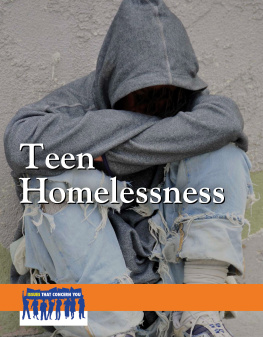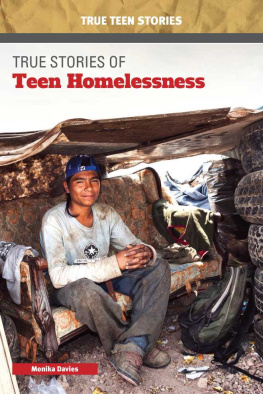CATCHING
HOMELESSNESS

Copyright 2016 by Josephine Ensign
All rights reserved. No part of this publication may be reproduced, distributed, or transmitted in any form or by any means, including photocopying, recording, digital scanning, or other electronic or mechanical methods, without the prior written permission of the publisher, except in the case of brief quotations embodied in critical reviews and certain other noncommercial uses permitted by copyright law. For permission requests, please address She Writes Press.
Published 2016
Printed in the United States of America
Print ISBN: 978-1-63152-117-1
E-ISBN: 978-1-63152-118-8
Library of Congress Control Number: 2016937782
For information, address:
She Writes Press
1563 Solano Ave #546
Berkeley, CA 94707
Cover design Rebecca Lown
Interior design Tabitha Lahr
She Writes Press is a division of SparkPoint Studio, LLC.
Portions of the book have appeared in print in different forms:
First Families was published as Gone South in Silk Road, Vol 6.1, Spring 2011.
Homeless Ghosts was published in University of Iowas The Examined Life Journal, Issue 2.1, Fall 2012.
Next of Kin was published in the anthology I Wasnt Strong Like This When I Started Out: True Stories of Becoming a Nurse, edited by Lee Gutkind, In Fact Books, 2013.
Parts of Catching Homelessness were published as No Place Like Home(less) in Pulse: Voices from the Heart of Medicine magazine, May 30, 2014.
Greyhound Therapy was published in Front Porch Journal, Issue 32, Spring 2016.
In memory of my mother,
Ruth Singley Ensign (19232008)
Most of us live homeless, in the neighborhood of our true selves.
Rachel Naomi Remen
CONTENTS
Authors Note
A FEW YEARS AGO, while working with Public HealthSeattle & King County on a medical respite project for homeless youth, my own homeless shadow resurfaced. I was in downtown Seattle at the YWCA womens shelter, waiting inside the front lobby for the rest of our group to arrive. We were scheduled to have a tour of the facility to see how they ran their medical respite program. Id taken the city bus and had purposefully dressed down in jeans, a sweater, and a raincoat. It was late afternoon, raining outside, and I saw soliciting, pimping, prostituting, and drug dealing happening on the sidewalk in front of the shelter. The members of my medical respite group were buzzed in the front door. At the same time, a homeless woman resident walked up to me and asked, Did you stay at a hotel last night on Aurora instead of here again? Aurora Avenue is one of Seattles main prostitution areas.
I looked up at her in alarm. Im sorry. You must have me mixed up with someone else. Im not staying here, Im just visiting.
The people in my group overheard this interchange. Later, they teased me about it, saying how preposterous it was. I was a university professor, for Gods sake! There was no way I could be homeless, much less a homeless prostitute. But I couldnt shake the feeling that my cover had been blown, that Id been found out, that my homeless shadow was showing. You were homelesswhy? What was wrong with you? Those are the questions people ask meor want to ask mewhenever they discover I was homeless. Coming out of the closet about my own homelessness was never an option for me. It could derail my career, hurt my family, and marginalize me even more. It was largely why I had moved across the country to Seattle, to escape the memories of having been homeless in my hometown of Richmond, Virginia. But standing there in the YWCA shelter, I recognized the ironyand the hypocrisyembedded in my reaction to the womans question. Here I was an outspoken advocate for people who were homeless, while secretly judging them, and by extension, judging myself.
Homelessness is exhausting and soul sucking. Homelessness has marked me. Like the star-shaped surgery scars on my belly, the body harbors secrets. Homelessness is a type of deep illness, a term coined by sociologist Arthur Frank for an illness that leaves you feeling dislocated, an illness that casts a shadow over your life. That shadow never completely goes away. At some point it was time to acknowledge my homeless shadow, time to remember.
This book is the result of my acknowledging and remembering. It is the story of my experiences with homelessness, both as a nurse practitioner working with homeless people, and as a homeless person. The stories in Catching Homelessness are about events that have happened to me through my work with homeless people. The stories are all factual in that they actually happened. My perception of them at the time of the events and my memories of them inform the stories. Many of my interactions with people in these stories were within an ongoing professional relationship. Since I recount stories of specific patients I worked with, out of ethical and legal obligations I have altered some biographical details and changed names in order to protect their identities. I have not changed the names of coworkers and friends, except where indicated.
I have kept detailed journals, both personal and work- related, throughout my life. These were invaluable resources for writing this book. Because I have a background and training in anthropology, my work-related journals were written as expanded field notes. In my journals I recorded patient stories, direct quotes, profiles, and personality quirks of coworkers, as well as my reflections on my actions and on events with which I was involved. I kept copies of my detailed monthly and year-end clinic statistics, narrative reports, and letters that I submitted to the CrossOver Clinic board of directors, for whom I worked; these became sources of information for sections of this book. I also drew upon archived newspaper articles, mainly from The Richmond Times-Dispatch, the leading newspaper in Richmond at the time, and currently the citys only major newspaper. For some chapters, I relied on interviews with people working with homeless people in Richmond, site visits, and reports (past and present) on homelessness in Richmond and in Virginia, as well as nationally. In the appendices I include a list of the main references I consulted while writing this book.
I use terms for race or ethnicity based on the commonly accepted terms during the time period for which I am writing, or the terms preferred by the people I am writing about. Hence, I use black or African-American, Native American or American Indian depending on the context. Other terms, such as mentally retarded or developmentally disabled, I use based on accepted terminology within the US medical and legal realms of a particular time period.
Stories analyze us if we pay attention to what attracts or repels us while reading or hearing the stories, and if we reflect on why that is so. Stories we understand are stories we easily forget. Perhaps that is why the stories I recount in this book are the ones that most vividly survived for me. I dont completely understand them. Even after writing theman act that brings some coherencethey keep their secrets.
Catching Homelessness is about what people who have experienced homelessness can teach us about our society and ourselves. My aim is to provide a framework for the empathy necessary to create positive change for people pushed to the margins. By illuminating the margins, we can see more of the truth about our societys core, and about ourselves.
CHAPTER ONE:
Next of Kin
Next page







